Toilet crisis at Makerere, MUBS, and Kyambogo
Haruna Muwanga, a first-year diploma student at the faculty of arts and social sciences, says pipes in the toilets leak, so the floor is always wet and the toilet bowls are broken. “Sometimes you fail to get where to squat,” he says
WATER AND SANITATION
KAMPALA- Who is responsible for overseeing sanitation at institutions of higher learning?
Last week on Thursday morning, Makerere University students of Michael Hall took out placards and demonstrated over the appalling conditions of toilets.
According to the guild president, Papa Were Salim, dozens of students staying in Michael Hall gathered at the main building at around 10:00am. Were said the students vowed not to leave until the university administration addressed them on the toilet crisis.
Saturday Vision has learnt that since this semester started, Block D and Block C of Mitchel Hall have had no functioning toilets. Students say for about five months, they have been using toilets in the neighbouring Blocks A and B. As a result, they have suffered long queues.
Were said it took the intervention of guild officials and the dean of students to calm the students.
"Later, students leaders met with the dean (of students, Cyriaco Kabagambe), after which a letter was issued in which the university committed itself to find funds immediately to resume refurbishing the lavatories," he said.
According to the guild president, Kabagambe told students that the university had earmarked sh1.3b to refurbish the toilets and this money was expected to come from the students' fees this semester. But that the poor inflow of tuition fees did not raise enough money quickly.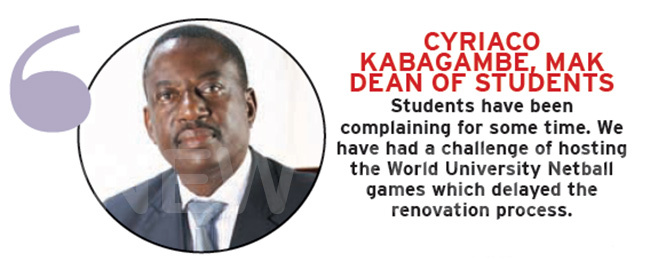
Saturday Vision learnt that at the time the university started refurbishing the toilets during last semester's recess, some toilets had no doors and students were using temporary curtains.
"The refurbishing has resumed today, Thursday," Were said. "I have even received communication from all the affected halls of residence that the construction has resumed."
According to the guild president, the affected halls of residence are Mitchel, Nsibirwa, and Lumumba. Journalism@Muk, a students' website that runs news updates about events in Makerere University reported early this week that the poor sanitation at the university had been complicated by a water crisis that had left the few functioning toilets without water for flushing.
Kabagambe acknowledged the problem.
"What happened on Thursday was just a reminder to the university administration about the few toilet facilities in the halls of residence.
Students have been complaining for some time. We have had a challenge of hosting the World University Netball games, which delayed the renovation process. We have now resumed and promise to complete the renovations by November," he said.
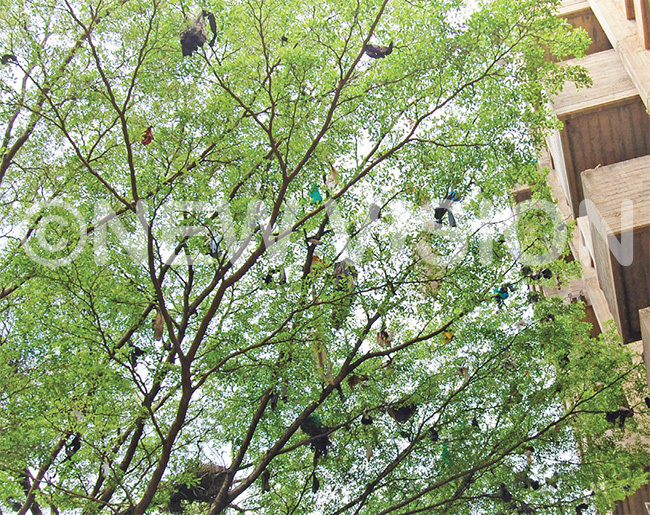 Some students at Mary Stuart Hall dispose of pads on this tree's branches near their hall
Some students at Mary Stuart Hall dispose of pads on this tree's branches near their hall
Makerere problem
The toilet crisis is not limited to Mitchel Hall. At Mary Stuart Hall, an unpleasant smell welcomes you on the ground floor, with stagnant and smelly water. Flies are hovering around the hall.
"The situation is not good here because of the broken sewage pipes and students no longer care to pour water as required," a female student said. "Can you imagine I have been waiting here in the queue for the last 10 minutes to enter the toilets, but none of those people inside is coming out. What if I had diarrhoea?"
The situation is worse when it comes to the disposal of used sanitary pads that are scattered everywhere around the hall, including on the tree branches. Students said the incinerator, where they used to deposit the pads, is dysfunctional.
Sawuya Namuwaya, a first-year law student and a resident of Mary Stuart, told Saturday Vision that the poor toilet facilities have made life very hard.
"The situation is worse in the evening," she said. "Usually, in the morning, the toilets are clean because the cleaners do their work. But when it gets to the evening, things become bad. Some students do not flush; others just urinate on the floors." Namuwaya said it gets worse when the taps get dry.
"For example, we spent the previous week (a week leading to the end of September) with no water," she says.
"Some students had to return home for a while until the water returned. Those who had nowhere to go defecated in the already full toilets, others on the floor. The weak-hearted ran to the nearby hostels outside the university to ease themselves." Saturday Vision visited universities around Kampala to compare the toilet situation.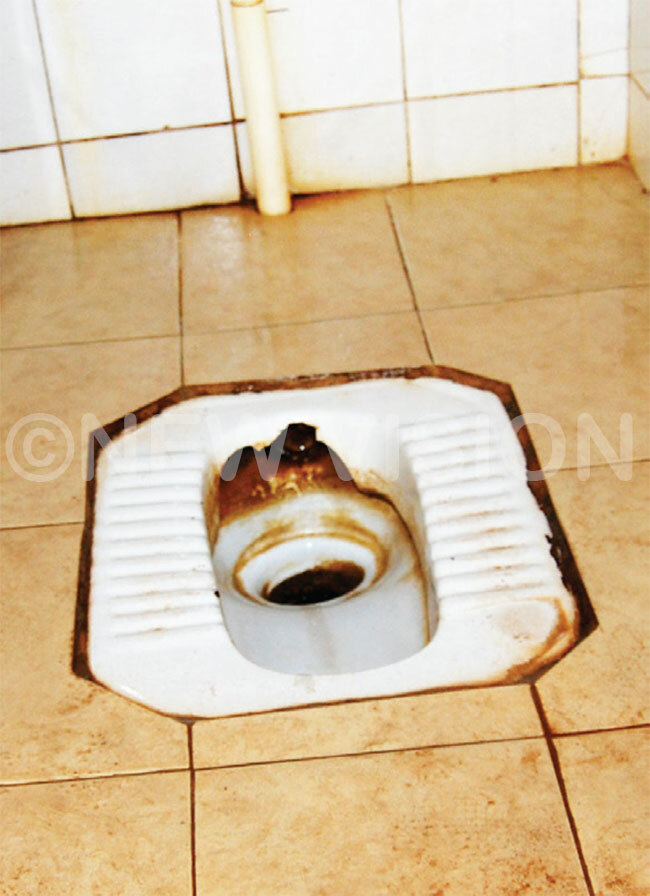 The few toilets of Mitchel Hall are broken
The few toilets of Mitchel Hall are broken
MUBS
Makerere University Business School (MUBS), even after a toilet cleaner has finished his work, you will still be hit by a pungent smell when you enter the washrooms. But despite the odour, about four female students were found standing by the mirrors, applying make-up while engrossed in a conversation about the worth of the outfits they wore.
"This dress cost only sh10,000," one of them said as she held up the hem of her dress.
Another got out of one of the toilets to wash her hands. When asked if the toilet she just used was clean, she said: "There is no water, try the next one." And then hurried away.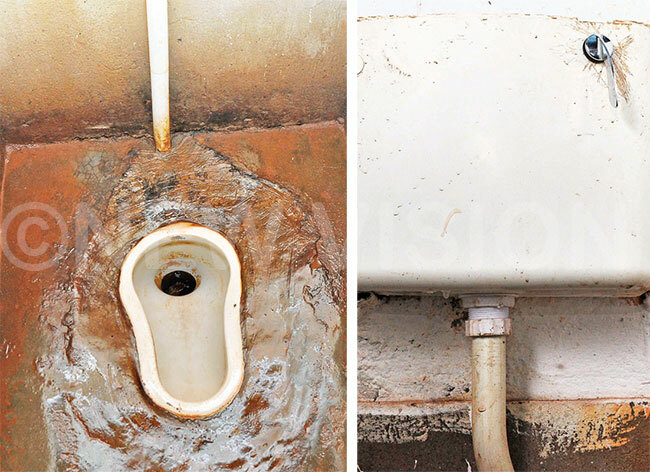 MUBS toilet floors are wet and faulty
MUBS toilet floors are wet and faulty
The handles for flushing were broken and the bowls stained with a dark coating. The sinks were leaking and had pockets of water below them. The floor was wet and there was no soap or toilet tissue.
The MUBS spokesperson, Simon Peter Odoki, downplayed the problem.
"The university prioritises sanitation," he said, "I am sure the lavatories are in good condition.
It is possible that due to the big population, soap may run out in during the day, but it does not mean that the sanitation is poor."
Nkumba
Saturday Vision arrived at Nkumba University at 4:00pm and found the floor in the toilets dirty. The toilets at the classroom blocks are cleaned only once a day, in the morning, but there was no soap or tissue.
There are also few toilets inside the students' hostels, such as in Nnabagereka Hostel.
Martha, a law student, said recently, the toilets inside one of the classroom blocks near the law school and the SBA block caved in and nearly killed a university administrator.
"Now we are using the staff toilets at the SBA block, but we fear that even these toilets could collapse any time," she said.
One of the cleaners told Saturday Vision that he had complained to the administration about the status of the toilets even before the collapse, but nothing was done.
KIU
At Kampala International University (KIU), some of the toilet facilities have water, but no soap. There were also three toilets on campus that needed serious repair.
The toilets had no symbols showing whether they were for men or women. Each floor has toilets, but some of them were dilapidated and needed urgent attention. There was also no soap for washing hands.
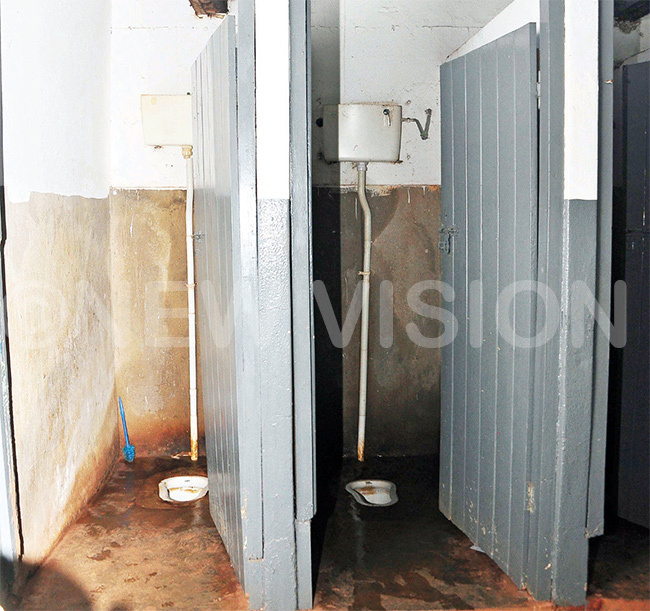
Kyambogo University
Haruna Muwanga, a first-year diploma student at the faculty of arts and social sciences, says pipes in the toilets leak, so the floor is always wet and the toilet bowls are broken.
"Sometimes you fail to get where to squat," he says. Muwanga adds that there are four toilets for men at the faculty which are few compared to the "more than 500" students that use them.
Female students residing in the halls at the university also said their toilets are filthy.
Olivia Nalule, a freshman at the faculty of arts and social sciences, said many toilets are dirty and some have broken handles, which means they cannot flush.
Saturday Vision saw a man in a grey Kaunda suit visiting a block of toilets below the department of civil and building engineering which Nalule had said were out of use. Upon visiting the same block of toilets, it was a shock to find weeds on the wall and toilet bowls stuffed with rubbish in polythene bags. The toilets do not have cisterns, which is proof that they are out of use; but this did not seem to stop some people from using them.
Along the path after this block of toilets is another block that is out of use, but not sealed off.
However, Innocent Niwaha, a second-year student of education, says the new TTE (Technical
Teacher Education) building and CTF (Central Teaching Facility) have clean toilets and liquid soap. Grace Lubaale, the chairperson of the teaching staff, said there is a problem with toilet facilities and it is due to the incompetence within the administration.
"The university administration has failed to plan well as far as toilets are concerned, saying their priorities are elsewhere," he said.
The guild president, German Amanya, told Saturday Vision that most of the old lavatories are in bad shape.
"There is need to revamp the whole lavatory system which was constructed for 5,000 students.
When Kyambogo became a university and its population increased to 30,000 students, nothing changed in toilet numbers," Amanya says.
He says he has engaged the administration, but he is also aware that the university's budget is limited.
"I am not the first guild president to advocate for the revamping of the lavatories.
All my predecessors tried, but nothing changed because of the budget limitations," he says.
The university vice-chancellor, Prof. Eli Katunguka, said they have been in talks with the Government over fixing the poor sanitation.
"We want the Government to help us overhaul the sewage system because the pipes that were used in the 1940s and 1950s were quite small and many of them have rotten away. We are going to do the overhaul in three phases. We have finished phase one at the western end of the university and connected all the buildings to the new line, which empties into the lagoon," he said. "In addition, we made sure that all the new buildings have enough lavatories for both female and male students. We are also planning to budget for more modern toilets and not pit-latrines next year."
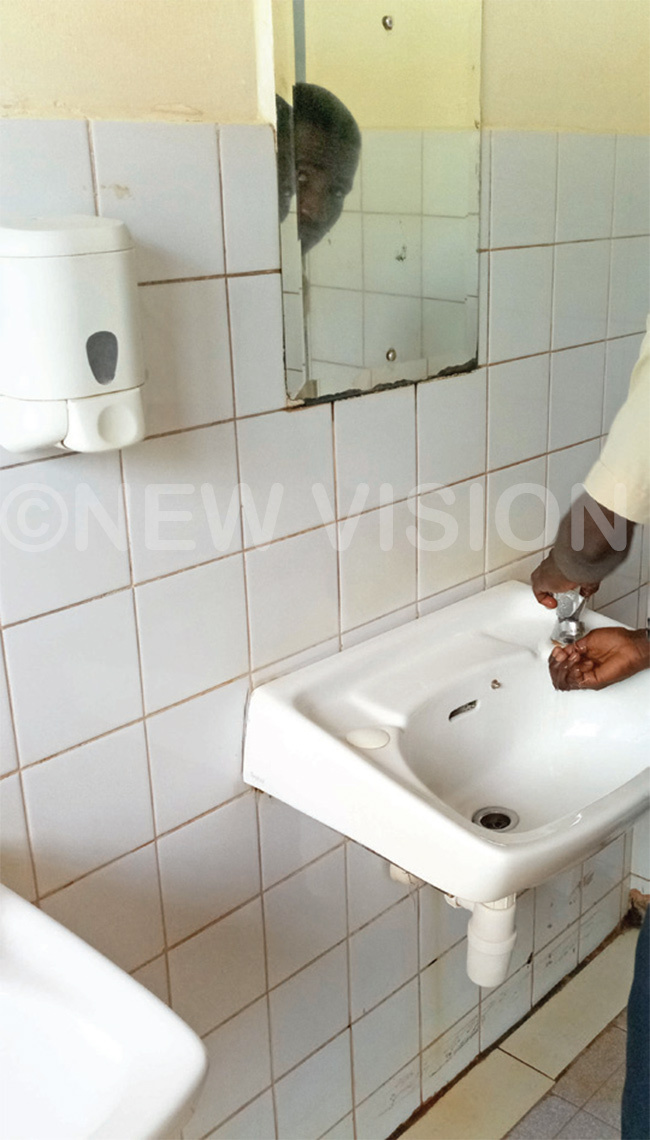 UCU lavatories are clean
UCU lavatories are clean
CLEAN TOILETS
UCU
At Uganda Christian University (UCU) in Mukono, students are provided with not only toilet paper but also liquid soap and water to wash their hands after visiting the toilets.
The toilet paper is found at the entrance of the toilet facility at Nkoyooyo Hall. This is the university's main hall and it is usually busy during the day as it accommodates a large number of students, making the good toilet facility critical.
A few metres away from Nkoyooyo Hall is a water tap that provides clean drinking water which is accessible by every member of the community.
The university has got a number of other toilets spread across its large compound.
They are clean, well kept and attended to by full-time staff.
The university also has special bins in the halls where used pads are dumped before they are taken to the incinerator.
Victoria University
At Victoria University in Kampala, toilets are good, smell fresh, with running water and a fine flushing system.
There is neither bad smell nor flies. There is a rota for cleaners, indicating a schedule of three times a day and students had no complaints.
Cavendish
At Cavendish in Nsambya, the toilets are sparkling clean, but few. Sometimes men use the women's side and vice-versa.
During our visit, our reporter was advised to use the men's side because the section for the women was busy.
One of the cleaners said the washrooms are cleaned after every five minutes.
NCHE, KCCA respond
The director of public health at Kampala Capital City Authority (KCCA), Daniel Okello, said he was not aware of the poor sanitation in public universities. Okello, whose docket supervises sanitation in the city, said universities should have clean lavatories for students. But he did not say whether his team would intervene.
Yossa Kazimoto, a public health expert, explained that wherever toilets are inadequate for any large population, there is a possibility of misusing them.
"This could result in the spreading of a number of diseases, such as diarrhoea, typhoid, dysentery, and worms," he said.
Kazimoto said one stance of a pit-latrine should accommodate 30 people, while for a flush toilet, one is adequate for only 25 people.
This means that with 40,000 students, Makerere University needs over 1,300 stores of pit-latrines and 1,600 stores of flush toilets. Most of the universities do not even have half the required ratios.
Kazimoto noted that inadequate toilets could result in open defecation which would lead to contamination of water and food, resulting in a number of water-borne diseases.
Experts fear that any disease outbreak at any of the universities could cause serious havoc in the city because students freely interact with the city populace. It would also disappoint parents who pay a lot of money for their children to study in a conducive environment.
When asked, the spokesperson of education ministry, Aggrey Kibenge, said any public place such as universities, must have clean lavatories.
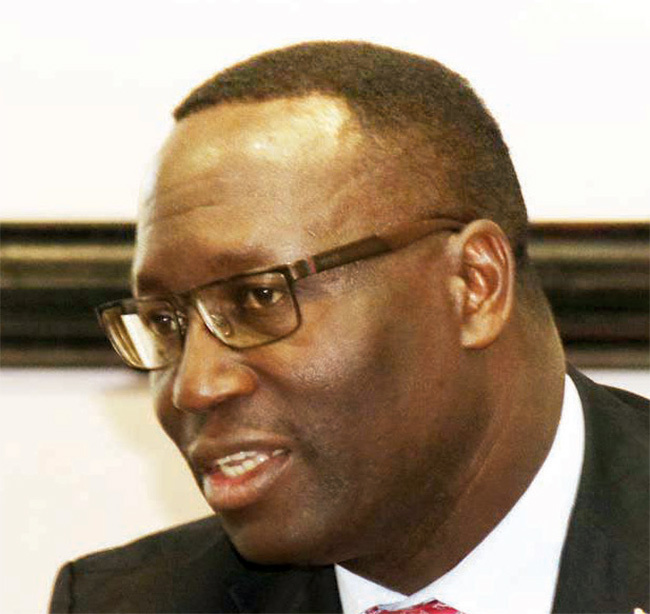 Kibenge
Kibenge
"But if there is a problem of lavatories in universities, it is a local management problem and you should put to task the individual university administration to explain the cause," Kibenge said.
He noted that universities are semi-autonomous because they get their money directly from the Government and that the ministry does not interfere in non-policy issues.
The National Council for Higher Education (NCHE), which oversees standards at universities, said sanitation is part of the conducive learning environment they are charged with ensuring. However, the spokesperson, Saul Waigolo, said they consider sanitation before allowing universities to start operating. But after that, the council may not easily know what is happening inside the halls of residence.
Waigolo urged universities to ensure that their lavatories are clean and enough not only to cater for the student numbers but also providing a conducive learning environment.
"NCHE is aware of the inadequate funding from the Government to cater for the lavatories as student numbers keep increasing. The problem is not only in universities. But each concerned administration should find appropriate solutions.
"In the end, toilets at universities remain the issue of the respective administrations. What is needed is to keep the administrations in check in case they negate on their responsibilities," Waigolo said.